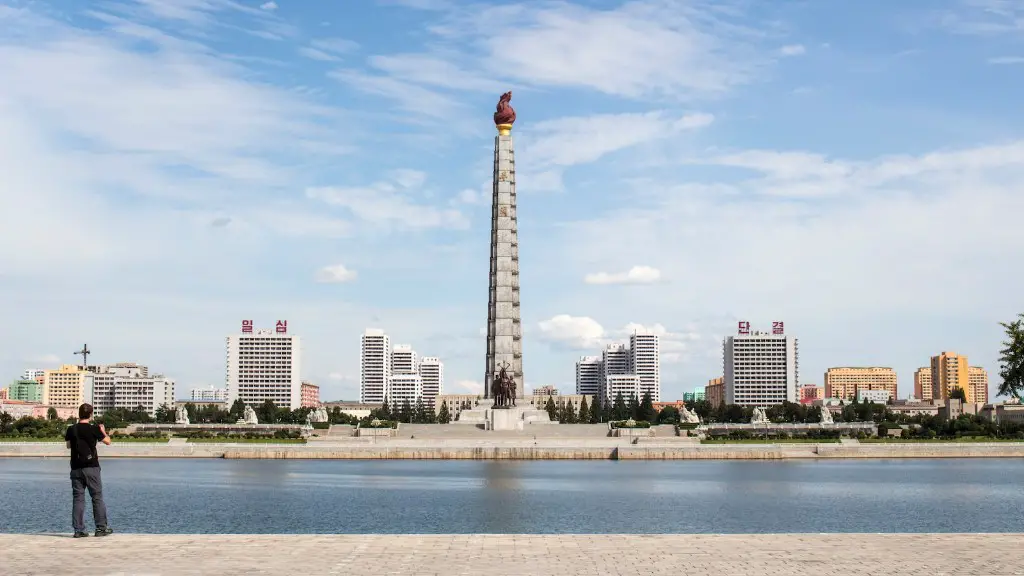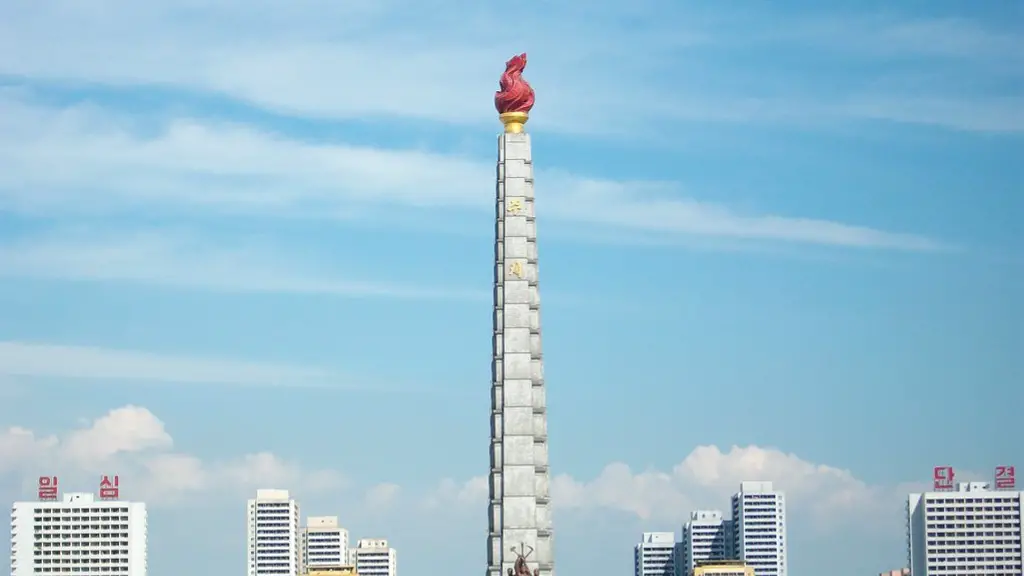Would China help North Korea in a potential war situation? It’s a question that is looming large over the heavily militarized Korean peninsula. On one side of the debate, some believe that China would never help an unpredictable, nuclear-armed North Korea in any kind of conflict. On the other hand, others point to China’s long history of diplomatic and economic support to the region, and suggest that the world’s second largest economy may indeed be ready to step up militaristically if it saw its Asian ally in real peril.
To get a sense of how likely this scenario is, it’s important to understand the complex history of the Korean peninsula. Despite adopting two completely different paths since the 1950s, North and South Korea remain locked in a persistent struggle for unification. In the wake of the Korean War, China has historically remained staunchly behind North Korea. For its part, South Korea has close ties to the United States and also has at least a quasi-ally in Japan, thus perpetuating an ever-tense balance of power between the region’s main players.
China’s Position In The Asia Pacific
China’s position has changed significantly over the years. In modern times, it has attempted to shift its international standing from what many see as a tumultuous, distrusted power to that of a more responsible and essential world leader. From a diplomatic perspective, whether or not to support a North Korean regime that potentially holds the world hostage is a complicated decision for Chinese leadership.
As experienced by North Korea’s unapologetic nuclear provocations, global pressure is mounting on the country to abandon its belligerent policy. In the face of such international condemnation and the looming threat of a potential US led response, China is undeniably feeling the squeeze.
That said, it is important to consider that an international reaction to possible North Korean aggression may be viewed by China as a potential threat to its own security as well. Unlike the US and its allies, China – and North Korea to some extent – could be hit not just psychologically, economically, or militarily, but also diplomatically.
With this in mind, it is perhaps easier to understand the Chinese leadership’s ambivalent attitude. From time to time, Beijing appears to tighten restrictions, only to later soften them. This might be interpreted as an expression of ‘flexibility’ and levelheadedness amid a highly tense international climate.
The Importance Of China-North Korea Relations
Nevertheless, North Korea remains heavily reliant on Chinese imports and trade, estimated to amount to somewhere between 40%-70% of North Korea’s total foreign trade, depending on who you ask. Traditionally, North Korean fertilizers and other agricultural products have been some of China’s top exports.
At the same time, the country is highly dependent on China for energy – China currently accounts for over 90% of North Korea’s crude oil needs. For its part, the Chinese government has historically been one of the strongest advocates of the so-called ‘Sunshine Policy’, pointing out the importance of stabilizing the region through economic cooperation.
In the context of Chinese economic relations between the two countries, it is necessary and understandable that Beijing would not wish to detach itself entirely from North Korea, since doing so could potentially benefit US and South Korean interests, both of which China sees as a potential threat.
All of this is to say that while numerous strategic and domestic factors are certainly in play, a strong relationship between China and North Korea remains key. North Korea’s capacity to defend itself will depend on how China views the nuclear threat associated with Pyongyang’s regime. An answer to this question isn’t likely to come soon. But while the potential of China helping North Korea remains unclear, it’s worth noting that in spite of the obstacles, it is still possible.
What Would China’s Reaction Be In A War Situation?
So what would China’s response be if war broke out? It is widely believed that Chinese support would be limited to certain degree. For example, it is believed that the country would take part in a military action only if deemed absolutely necessary for Chinese interests. It is also believed that China would not resort to military aggression manifesting in the form of an outright invasion, although it might provide civil defense or indirect support.
At a theoretical level, China could even covertly support North Korea in a potential crisis through the delivery of food and medical supplies. That said, it is more plausible that China’s response would be limited to diplomatic means, as it pushes for a more measured and managed resolution.
However, it is possible that China could engage North Korea militarily if the situation deteriorated to an extreme level. While such a move is far from certain, the potential remains. Therefore, while the international community remains divided on the likelihood of a war, the question of whether or not China will join the fray is something that looms large over the Korean peninsula.
Relationships Between China and South Korea
Given its long-standing relationship with North Korea and the possibility of Chinese military involvement, attention also needs to be paid to China’s relationship with South Korea. This is especially pertinent given the long history of China’s ties to North Korea and its support for a peaceful reunification of the Korean Peninsula.
Chinese-South Korean ties are at an all-time high. Both sides have engaged in a flurry of economic and trade deals, while cultural exchanges and people-to-people ties continue to strengthen. Beijing has made multiple visits to Seoul, while South Korean President Moon Jae-in recently concluded a two-day trip to Beijing.
In essence, both China and South Korea understand the importance of maintaining a good relationship as both must navigate the uncertainties of a potential crisis in the Korean Peninsula. China could potentially become a strong mediator in a crisis, particularly if South Korea decided to reach out to Beijing.
As already mentioned, China has strategically managed to remain in North Korean’s corner in order to protect its interests. With that said, Beijing would have to walk a fine line between supporting North Korea, and at the same time, respectfully communicating with Seoul, who could ultimately be an important partner in determining the future of the Peninsula.
Impediments To China-North Korea Relations
Despite its strategic and economic ties to North Korea, there remain various impediments that could impede the development of Chinese-North Korean relations. These include, but are not limited to, fresh sanctions imposed by the United Nations Security Council, and an internal Chinese economic slowdown that has resulted in it prioritizing investment and stability in its own backyard over North Korea.
Another factor which may hinder the relationship between China and North Korea is a growing rift between the two countries, due in large part to North Korea’s refusal to abandon its nuclear program and the ensuing economic sanctions that have weighed heavily on an already heavily battered North Korean economy.
Yet another factor is the volatile and unpredictable nature of North Korea’s leadership. This has become a major source of concern for the Chinese leadership, who are often unsure about Pyongyang’s intentions and ultimate aims and objectives. Beijing worries that the North Korean regime could potentially unearth security and stability in the region.
The Repercussions Of A War
Ultimately, a war on the Korean peninsula and potential Chinese involvement would be catastrophic for all parties involved. South Korean and US-backed coalition forces would be very hard-pressed to repel a potential North Korean assault. The resulting crisis would almost certainly plunge the region into chaos and could result in incalculable economic and social damage to the region.
Moreover, a potential conflict has the potential to escalate into a full-blown regional crisis, with China, Japan, and other countries potentially drawn into the conflict. The economic consequences for China and the rest of the region would be disastrous, and could potentially undermine the fragile stability of the Asia Pacific region.
In the case of China, a war on the Korean peninsula would undermine its status as a global power, cause economic chaos in its own backyard, and ultimately make for an uncertain future. This is why there is a strong incentive for China to ensure that the situation does not deteriorate to a point of no return.
Final Stance On The Matter
In conclusion, we can certainly say that a crisis on the Korean peninsula would be extremely damaging for all parties involved. That said, whether China would intervene to help North Korean in the case of a war is a complex and multi-faceted question. It is clear that China has close strategic and economic ties with North Korea, but it also has many imperatives not to get involved in a potential conflict.
Ultimately, it is unlikely that China would unequivocally join a potential conflict initiated by North Korea, though Beijing might provide civil or indirect support to its wayward ally.
Therefore, while China’s role in such a conflict remains uncertain, it is plausible that Beijing would shift its stance depending on its strategic interests and the general political situation in the region.





